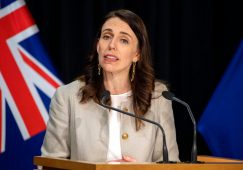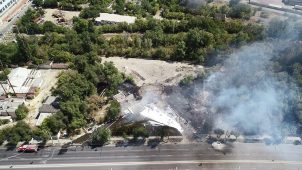French Government Suspends Fuel Tax Increase theguardian.com
The French government has suspended plans to introduce an eco-fuel tax after three weeks of increasingly violent protests across the country.
Bowing to pressure from the street, the prime minister, Édouard Philippe, also announced an immediate freeze on gas and electricity prices – but he warned further violence would not be tolerated.
Philippe’s announcement came after he met cabinet ministers on Tuesday morning to agree a response to a weekend of rioting, looting and destruction in Paris by an extreme fringe of the gilets jaunes (yellow vests) movement.
The tax on petrol and diesel, due to increase next month in a move towards cleaner fuels, had sparked national demonstrations that quickly grew to encompass wider anger and frustration at the country’s leaders.
Who are the gilets jaunes and what do they want?
Read more
The president, Emmanuel Macron, had repeatedly vowed not to give in to street rule, but has been forced to reconsider after the worst violence in Paris in half a century.
“Thousands of French have expressed their anger,” Philippe said in a televised statement. This anger goes back a long way and has often remained silent. Today it’s being expressed with force and in a collective way.”
He added: “One would have to be deaf and blind not to see or hear this. I hear this anger and I have understood its basis, its force and its seriousness. It is the anger of the French who work and work hard, but still have difficulty making ends meet, who find their backs against the wall.
Advertisement
“They have a sense of profound injustice at not being able to live a dignified life when they are working.”
The PM announced that two controversial measures due to be introduced next month, the increase in fuel prices and new tougher rules on vehicle checks, would be suspended for six months.
He also promised consultations on possible measures to help those who work far from home and changes in the tax system, which he said was complex and the most onerous in Europe.
“If events of the last days have shown anything it’s that the French do not want any more taxes or charges. But no tax merits putting in danger national unity.”
It remains to be seen whether the measures are enough to calm the volatile situation in France that saw one of the most exclusive areas of Paris set on fire on Saturday as protesters torched cars, buildings and looted luxury goods stores around the Champs Elysées and Arc de Triomphe.
The gilets jaunes have called for a further protest in Paris this Saturday.
Philippe said the right and freedom to demonstrate was “fundamental in France”, but added: “We will not accept the violence we saw last weekend. If there is a new day of mobilisation, it must be declared [registered with police in advance] and happen calmly.”
On Monday evening, Macron held an emergency meeting at the Élysée palace to deal with the political and social crisis, the most serious since he was elected on a centrist, reforming programme in May 2017.
Stanislas Guerini, the leader of Marcon’s La République En Marche parliamentary group, told French radio: “While there’s a debate, we stop writing, have a pause … there has to be a pause so the debate can happen.”
Philippe was due to meet representatives from the gilets jaunes on Tuesday afternoon, but the meeting was cancelled after the unofficial representatives were allegedly threatened and disowned by other protesters.
The protest movement, which has no organisation or leaders, has broadened its demands to include Macron’s resignation and the dissolution of the French parliament.
Benjamin Cauchy, a spokesperson for the gilets jaunes libres (free yellow vests) – a subgroup – said the movement’s demands included a redistribution of wealth as well as rises in salaries, pensions, social security payments and the minimum wage. He insisted the dialogue between the government and protesters did not have to be face to face.
“This is the 21st century and dialogue can happen by social networks and the media even without a meeting,” Cauchy said.
“This started with ecological transition but what France wants is political transition.” He said protests should be “pacifist”.
Macron has postponed a two-day visit to Serbia this week to deal with the crisis. On Saturday, police fought running battles with masked protesters who painted graffiti on the Arc de Triomphe, pulled down iron railings at the Tuileries Gardens, torched cars, set fire to buildings and looted luxury stores.
Three hundred and seventy-eight people were arrested; police said many were older males – aged between 30 and 40 – from outside the French capital who had come intending to fight police.
Since you're here…
… we have a small favour to ask. Three years ago we set out to make The Guardian sustainable by deepening our relationship with our readers. The same technologies that connected us with a global audience had also shifted advertising revenues away from news publishers. We decided to seek an approach that would allow us to keep our journalism open and accessible to everyone, regardless of where they live or what they can afford.
More than one million readers have now supported our independent, investigative journalism through contributions, membership or subscriptions, which has played such an important part in helping The Guardian overcome a perilous financial situation globally. We want to thank you for all of your support. But we have to maintain and build on that support for every year to come.
Sustained support from our readers enables us to continue pursuing difficult stories in challenging times of political upheaval, when factual reporting has never been more critical. The Guardian is editorially independent – our journalism is free from commercial bias and not influenced by billionaire owners, politicians or shareholders. No one edits our editor. No one steers our opinion. This is important because it enables us to give a voice to those less heard, challenge the powerful and hold them to account. Readers’ support means we can continue bringing The Guardian’s independent journalism to the world.
If everyone who reads our reporting, who likes it, helps to support it, our future would be much more secure. For as little as $1, you can support the Guardian – and it only takes a minute. Thank you.






Leave Your Comment